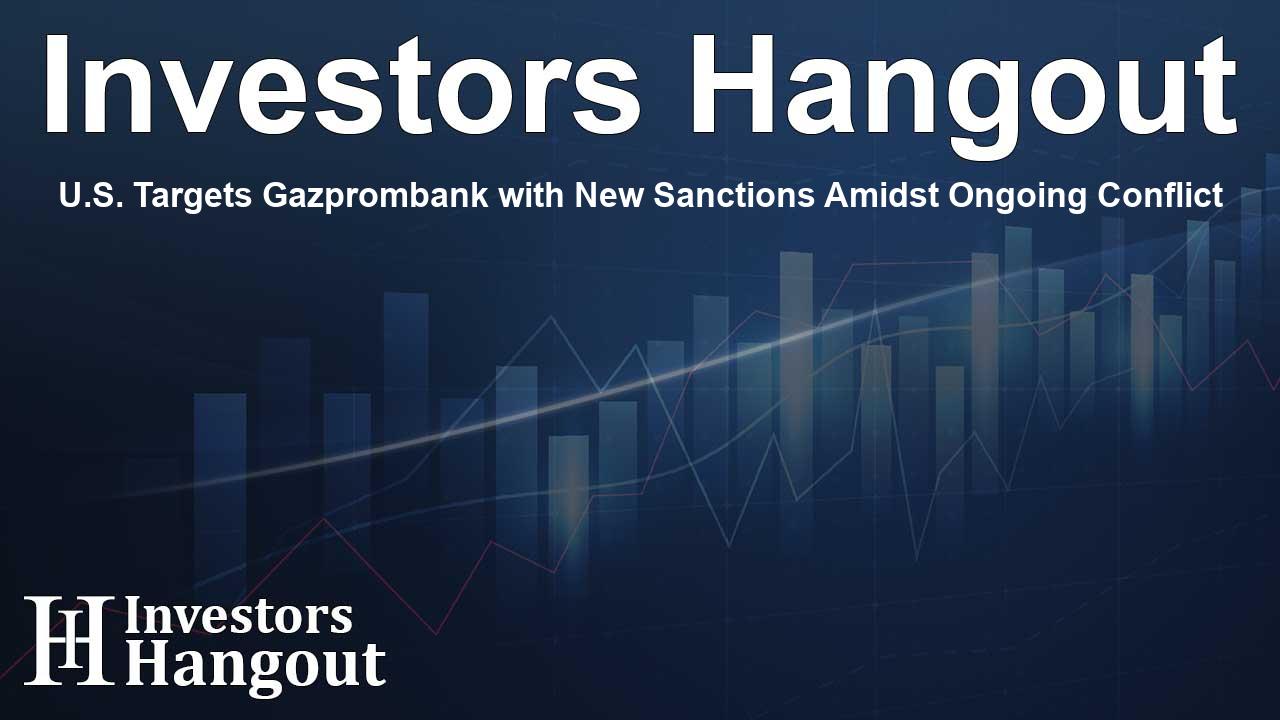U.S. Targets Gazprombank with New Sanctions Amidst Ongoing Conflict

Sanctions Against Gazprombank: An Overview
In a significant move, the United States has imposed fresh sanctions targeting Gazprombank, a major player in the Russian banking sector, as tensions escalate due to the ongoing conflict in Ukraine. The Treasury Department announced these actions, which are among the most severe sanctions applied to a financial institution, aiming to strengthen the economic pressure on Moscow.
Details of the Sanctions
The recent sanctions effectively exclude Gazprombank from the U.S. financial system, barring American individuals and companies from engaging in transactions with the bank. Furthermore, the assets of Gazprombank within the U.S. jurisdiction have been frozen, limiting its operational capabilities.
Gazprombank, which has deep ties with the Kremlin through its partial ownership by the gas giant Gazprom, plays a crucial role in facilitating financial transactions for Russia, particularly in relation to natural gas payments from European buyers. The U.S. aims to disrupt these financial flows, which have significant implications for the ongoing conflict.
Supporting Ukraine with Enhanced Sanctions
In the broader context of the Russian-Ukrainian war, the Biden administration's move to impose these sanctions comes as Ukraine continues to advocate for stronger support from the U.S. Since the onset of the invasion in early 2022, Ukraine has persistently urged Washington to take decisive actions against entities contributing to the Russian war effort.
These sanctions arrive shortly after the announcement that Ukraine can utilize U.S.-supplied ATACMS missiles to target Russian military positions. This development reflects a strategic shift to provide Ukraine with the means necessary for a more robust defense against Russian advances.
Impact on Financial Systems
The Treasury's actions include sanctions against 50 other smaller Russian banks, aimed at severing connections with the international financial system. This broad sweep is designed to limit Russia's access to resources needed to finance its military operations.
Treasury Secretary Janet Yellen emphasized that these measures would hinder the Kremlin's ability to evade sanctions and support its military complex. By decreasing Russia's financial maneuverability, the U.S. hopes to mitigate the effects of the invasion and support Ukraine’s quest for peace.
Authorizations and Future Considerations
Along with the sanctions, new licenses have been issued allowing U.S. entities to safely navigate transactions involving Gazprombank. This avenue is designed to enable an organized exit from any financial dealings with the bank, reflecting a recognition of the complex financial interdependencies that exist.
Importantly, these sanctions were enacted under an executive order from President Biden. However, it remains uncertain how the incoming administration might address these actions, raising questions about the potential for future policy shifts.
The Role of Gazprombank in Russia’s War Effort
Gazprombank serves as a vital financial channel for the Russian government, funding military purchases and compensating families of soldiers involved in the conflict. The bank's role extends beyond typical banking activities, acting as a crucial facilitator of Russia's wartime economy.
The implications of these sanctions are far-reaching, as U.S. officials believe they will enhance Ukraine's combat effectiveness and create a more favorable environment for potential negotiations.
Conclusion
The ongoing sanctions against Gazprombank represent a critical component of U.S. foreign policy aimed at supporting Ukraine and reducing Russia's military capabilities. As the conflict continues, the focus on economic measures highlights the interconnectedness of financial systems and military operations in modern warfare.
Frequently Asked Questions
What are the key objectives of the U.S. sanctions against Gazprombank?
The sanctions aim to isolate Gazprombank from the U.S. financial system and curb its role in financing the Russian military efforts in Ukraine.
How will these sanctions affect U.S.-Russia relations?
The sanctions are likely to exacerbate tensions between the U.S. and Russia, as they represent a direct challenge to Russian financial operations.
What is the significance of Gazprombank's relationship with the Kremlin?
Gazprombank’s close ties with the Kremlin underscore its importance in facilitating government funding and military expenditures.
How might the future administration change the current sanctions?
The future administration could potentially remove or modify the sanctions, depending on their approach to international relations and Russian aggression.
What role do sanctions play in the overall strategy to support Ukraine?
Sanctions are a crucial tool in the U.S. strategy to undermine Russia's military capacity and support Ukraine's defensive efforts.
About Investors Hangout
Investors Hangout is a leading online stock forum for financial discussion and learning, offering a wide range of free tools and resources. It draws in traders of all levels, who exchange market knowledge, investigate trading tactics, and keep an eye on industry developments in real time. Featuring financial articles, stock message boards, quotes, charts, company profiles, and live news updates. Through cooperative learning and a wealth of informational resources, it helps users from novices creating their first portfolios to experts honing their techniques. Join Investors Hangout today: https://investorshangout.com/
Disclaimer: The content of this article is solely for general informational purposes only; it does not represent legal, financial, or investment advice. Investors Hangout does not offer financial advice; the author is not a licensed financial advisor. Consult a qualified advisor before making any financial or investment decisions based on this article. The author's interpretation of publicly available data shapes the opinions presented here; as a result, they should not be taken as advice to purchase, sell, or hold any securities mentioned or any other investments. The author does not guarantee the accuracy, completeness, or timeliness of any material, providing it "as is." Information and market conditions may change; past performance is not indicative of future outcomes. If any of the material offered here is inaccurate, please contact us for corrections.